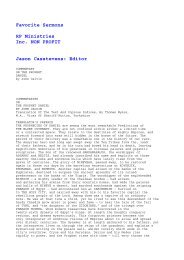Lamentations - The Sermon Depository
Lamentations - The Sermon Depository
Lamentations - The Sermon Depository
You also want an ePaper? Increase the reach of your titles
YUMPU automatically turns print PDFs into web optimized ePapers that Google loves.
the tabernacle; for it is the same word again, but it seems not to be taken in<br />
the same sense. <strong>The</strong>n I think that d[wm, muod, is to be taken here for the<br />
assembly. As he had previously said, that the place where the holy<br />
assemblies met had been overthrown or destroyed, so now he says, that<br />
God had no care for all those assemblies, as though they had been buried in<br />
perpetual oblivion; for he mentions also the Sabbath, which corresponds<br />
with the subject. God, then, had forgotten all the assemblies as well as the<br />
Sabbath. <strong>The</strong>re is, again, as to this last word, a part stated for the whole,<br />
for this word was no doubt intended to include all the festivals. <strong>The</strong><br />
meaning of the passage then is, that the impiety of the people had been so<br />
great, that God, having, as it were, forgotten his covenant, had inflicted<br />
such a dreadful punishment, that religion, for a time, was in a manner<br />
trodden under foot.<br />
He says, in the last place, that the king and the priest had been rejected by<br />
God. We have already said, that these were as two pledges of God’s<br />
paternal favor; for, on the one hand, he who reigned from the posterity of<br />
David was a living image of Christ; and on the other hand, there was<br />
always a high-priest from the posterity of Aaron to reconcile men to God.<br />
It was then the same as though God shewed himself in every way<br />
propitious to the chosen people. <strong>The</strong>n their true happiness was founded<br />
on the kingdom and the priesthood; for the kingdom was, as it were, a<br />
mark of God’s favor for their defense, and the priesthood was to them the<br />
means by which reconciliation with God was obtained. When, therefore,<br />
God wholly disregarded the king and the priest, it became hence evident,<br />
that he was greatly displeased with his people, having thus, in a manner,<br />
obliterated his favors. It follows, —<br />
<strong>Lamentations</strong> 2:7<br />
7. <strong>The</strong> Lord hath cast off his<br />
altar; he hath abhorred his<br />
sanctuary: he hath given up<br />
into the hand of the enemy<br />
the walls of her palaces; they<br />
have made a noise in the<br />
house of the Lord, as in the<br />
day of a solemn feast.<br />
7. Abominatus est Dominus altare suum,<br />
repulit (vel, rejecit procul ab animo suo)<br />
sanctuarium suum, tradidit in manum<br />
hostis muros palatiorum ejus, vocem<br />
ediderunt in domo Jehovae tanquam in die<br />
sacri conventus (vel, solemnis; iterum<br />
ponitur nomen d[wm tamen accipitur vel<br />
pro conventu vel pro die festo.)<br />
He proceeds with the same subject, and adopts similar words. He says<br />
first, that God had abominated his altar; F30 an expression not strictly<br />
proper, but the Prophet could not otherwise fully shew to the Jews what<br />
they deserved; for had he only spoken of the city, of the lands, of the<br />
palaces, of the vineyards, and, in short, of all their possessions, it would<br />
have been a much lighter matter; but when he says that God had counted<br />
as nothing all their sacred things, — the altar, the Temple, the ark of the<br />
covenant, and festive days, — when, therefore, he says, that God had not<br />
only disregarded, but had also cast away from him these things, which yet<br />
especially availed to conciliate his favor, the people must have hence<br />
perceived, except they were beyond measure stupid, how grievously they<br />
had provoked God’s wrath against themselves; for this was the same as<br />
though heaven and earth were blended together. Had there been an<br />
upsetting of all things, had the sun left its place and sunk into darkness,<br />
had the earth heaved upwards, the confusion would have hardly been more<br />
dreadful, than when God put forth thus his hand against the sanctuary, the<br />
altar, the festal days, and all their sacred things. But we must refer to the<br />
reason why this was done, even because the Temple had been long<br />
polluted by the iniquities of the people, and because all sacred things had<br />
been wickedly and disgracefully profaned. We now, then, understand the



